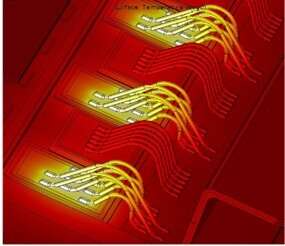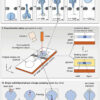Our electrical infrastructure has remained largely unchanged since World War II, but advances in technology—specifically materials—opened doors we never would have thought possible in the past. These advances have set the stage to redesign our electrical infrastructure for the next 100 years and beyond.
The redesign is critical because every day we put more stress on the electrical grid, demand faster computer processing, and push toward electrical transportation. The advanced and miniaturized semi-conductors powering these devices and infrastructure generate significant heat that can cause them to fail. These devices also need to be electrically isolated and protected from the elements.
As devices and infrastructure continue to advance, new types of electrical insulation are being developed worldwide to meet ever-increasing performance and reliability demands. Researchers from The University of Texas at Austin in collaboration with the U.S. Army Research Lab are analyzing new materials for electrical insulation, or packaging, that can remove heat more effectively compared to today’s insulation.
“An electrical grid caters to millions of homes and businesses and handles thousands of amps of current,” said Vaibhav Bahadur, co-author of a new paper published in Proceedings of the IEEE and an associate professor of thermal fluids systems in the Cockrell School of Engineering’s Walker Department of Mechanical Engineering. “We are talking about pretty significant heat generation, high voltages and the ability to survive extreme temperatures, which will only get worse in a changing climate.”
“The key problem we’ve identified is that improving thermal conductivity alone is not good enough,” Bahadur said. “You need a more holistic understanding of materials and multifunctional materials to meet electrical, thermal and mechanical requirements.”
Focusing on one property alone, such as thermal conductivity, is not enough to get the necessary performance and lifespan from electronic devices. You need to ensure that materials have large electrical resistance, tolerance to extreme temperatures, ability to handle mechanical stress and resistance to moisture, among other things. The grand challenge for materials developers is to improve all these properties simultaneously, instead of the current one-at-a-time approach.
“A comprehensive assessment of these new nanomaterials has not been done before,” said Robert Hebner, research professor at the Walker Department, director of UT’s Center for Electromechanics and paper co-author. “This article is a roadmap for the development of future materials. We provide a critical review and perspectives to the materials community from an engineering and reliability perspective.”
These new nanocomposite materials are made of polymers with nanoparticles in them and seek to reach thermal performance levels comparable to metals, while retaining the advantages of polymers—lightweight, not susceptible to corrosion, easier fabrication. Some of the most promising materials have close to 100 times the thermal conductivity of conventional polymers.
If we can advance electrical insulation in a holistic way, as researchers suggest, we can see improvements in many aspects of our lives. A dependable, renewables-based power grid. Faster laptop processors that don’t overheat. Powerplant cooling using air instead of scarce water resources. Even a transition to electric aviation with cables that can withstand the extreme heat generated during takeoff.
Given the global interest in these materials for wide-ranging applications, future progress can and should unfold quickly. Bahadur suggests that practical deployment of such advanced, multifunctional materials technology could happen as early as 2030.
New solid-state thermal diode developed with better rectification performance
More information:
Manojkumar Lokanathan et al, Review of Nanocomposite Dielectric Materials With High Thermal Conductivity, Proceedings of the IEEE (2021). DOI: 10.1109/JPROC.2021.3085836
Provided by
University of Texas at Austin
Citation:
A holistic approach to materials for the next generation of electrical insulation (2021, August 13)
retrieved 13 August 2021
from https://techxplore.com/news/2021-08-holistic-approach-materials-electrical-insulation.html
This document is subject to copyright. Apart from any fair dealing for the purpose of private study or research, no
part may be reproduced without the written permission. The content is provided for information purposes only.



